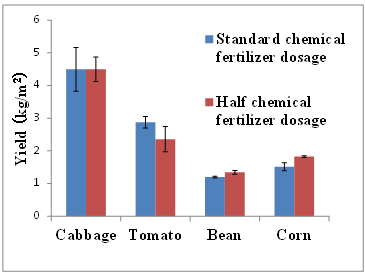Japanese PDF
English PDF
Poster PDF
| Attachment | Size |
|---|---|
| 491.7 KB |
Description
West Java Highland, which is underlain by soils derived from volcanic ash, is one of several production centers of temperate vegetables in Indonesia. Previous studies have found that vegetable farmers in this area tend to overdose on chemical fertilizer, thus organic matter application is considered an important option to improve soil fertility. However, the expansion of horticultural production in West Java Highland has caused a shortage of cow dung and chicken manure, which are popular forms of organic matter in the area. Although West Java Province has 14,000 horses (2014 data), horse manure use is very limited. This study, therefore, aimed to develop a technology to reduce chemical fertilizer application in West Java Highland without yield loss by applying horse manure, an underutilized organic resource in the area.
Horse manure is turned into compost by fermentation over a four-week period, with the manure turned over every week (Fig. 1). It contains around 0.7% nitrogen and 0.8% phosphate, which is equal to or higher than those of cow manure. Horse manure has lower C/N ratio than cow manure, which means that it is relatively easily decomposed in soil (Table 1). In field experiments at the Indonesian Vegetable Research Institute (IVEGRI), West Bandung, West Java, reducing chemical fertilizer application by half the standard dosage showed no significant yield difference if horse manure is also applied at an amount equal to 10t/ha (Fig. 2).
A field seminar was held at a village near IVEGRI, with seminar participants listening to explanations about chemical fertilizer reduction by manure application and receiving information leaflets written in the local language (Bahasa Indonesia) (Fig. 3). A questionnaire survey conducted after the seminar revealed that majority of farmers concerned (19 out of 30) were interested in technologies that reduce chemical fertilizer application.
In conclusion, it can be said that there is enough possibility for local vegetable farmers to apply this developed technology using local underutilized resources, such as horse manure, to reduce chemical fertilizer application. Horse dung production, which can be estimated from the number of horses in West Bandung, can meet the amount of horse manure necessary to enable the technology to be applied to all cabbage production areas in the region.
Affiliation
- Japan International Research Center for Agirucultural Sciences Research Strategy Office
Classification
Administration B- Fig. 1. Horse manure production
Horse dung is piled (left) and fermented in a bamboo cage (right). (Photos courtesy of the Indonesian Soil Research Institute) - Table 1. Nutrient content of horse and cow manure (% wet weight)*1 Katamine et al. (2000)
*2 Organic carbon in horse manure, total carbon in cow manure - Fig. 2. Vegetable yields after chemical fertilizer application at standard and at half dosage rates in field experimentsConditions: Horse manure 10t/ha, conventional tillage, average of three replications, error bars mean standard error
Cabbage and tomato: wet season in 2011
Bean: wet season in 2012
Corn: dry season in 2012
-
Fig. 3. Field seminar participants reading the information leaflet (inset) written in the local language
Program name
Environment and Natural Resource ManagementBudget
- 交付金›気候変動対応
Term of research
FY2015(FY2011-FY2015)Researcher
- Sugino Tomohide (Research Strategy Office)
- Sumarini Nani (Indonesian Vegetables Research Institute)
- Suwandi (Indonesian Vegetables Research Institute)
- Rini Rosliani (Indonesian Vegetables Research Institute)
- Diah Setyorini (Indonesian Soils Research Institute)
- Wiwik Hartatik (Indonesian Soils Research Institute)
- Rasti Saraswati (Indonesian Soils Research Institute)
For further details log on website :
https://www.jircas.go.jp/en/publication/research_results/2015_a01







No comments:
Post a Comment